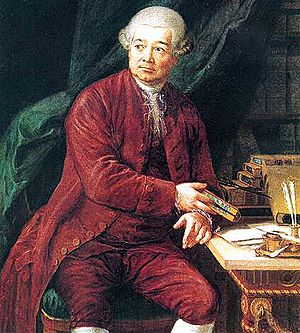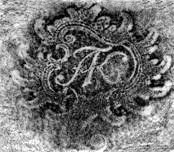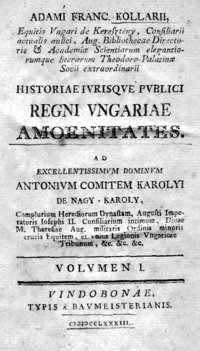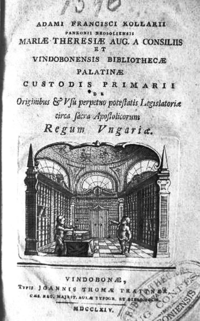Adam František Kollár facts for kids
Quick facts for kids
Adam František Kollár
|
|
|---|---|

Adam František Kollár, 1779
|
|
| Born | 17 April 1718 Tyerhova, Kingdom of Hungary (now Terchová, Slovakia)
|
| Died | 10 July 1783 (aged 65) |
| Other names | Adam Franciscus Kollar Adam Franz Kollar Kollár Ádám Ferenc |
| Education | University of Vienna |
| Occupation | Chief Imp.-Royal Librarian Imp.-Royal Court Councilor |
| Employer | Empress Maria Theresa |
| Known for | Coined the term ethnology Contributions to Ratio educationis of 1777 Advocacy of Habsburg Enlightened centralism |
| Title | Nobilis (landed in 1775) |
| Predecessor | Gerard van Swieten |
| Successor | Joseph von Martines |
| Children | Theresa (1773–1774) |
| Parent(s) | Matej Kolárik Regína Myslovská |
Adam František Kollár (1718–1783) was an important person from Slovakia. He was a lawyer, a historian, and a special librarian for the Habsburg monarchy. He also worked as a royal advisor. He was known for helping Empress Maria Theresa with her ideas to make the government stronger and more modern.
Kollár is famous for creating the word ethnology. This is the study of different peoples and cultures. He also helped the Habsburg rulers take over new lands like Galicia and Dalmatia. Some people even see him as one of the first people to support Slovak and Slavic groups in the Habsburg Empire.
Life Story: Adam František Kollár
When Was Adam Kollár Born and When Did He Die?
Adam František Kollár was born in a small town called Terchová in what is now Slovakia. This was part of the Kingdom of Hungary back then. He was likely born just before his baptism on April 17, 1718. His family was part of the lower nobility, meaning they had some land and a special title.
Kollár passed away on July 10, 1783, in Vienna, which was the capital city of the Habsburg Empire.
Adam Kollár's Education and Learning
Kollár's parents moved to Banská Bystrica, where he went to a middle school run by the Jesuits. The Jesuits were a religious group known for their excellent schools. He later studied at other Jesuit schools in Banská Štiavnica and Trnava. He then joined the Jesuit order himself.
He went on to study at the University of Vienna. He even taught at a Jesuit high school for a while before returning to Vienna to finish his studies.
Adam was very good at languages. He spoke his native Slovak, Latin, and German well. He also learned Hebrew and Middle Eastern languages. After leaving the Jesuits, he continued to learn many other languages, including Czech, Serbian, Polish, Russian, Hungarian, Turkish, Chinese, and French!
Here's a quick look at his education:
- Jesuit Slovak middle school, Banská Bystrica
- 1734 – Jesuit middle and high school, Banská Štiavnica
- 1734–1736 – Jesuit high school, Trnava
- 1736–1740 – Jesuit training (noviciate), Trnava
- 1740–1743 – Jesuit College (University of Vienna)
- 1744–1748 – Theology studies, University of Vienna
Adam Kollár's Career and Work
Adam F. Kollár started working at the Imperial-Royal Library in 1748. This was a huge library belonging to the royal family. He began as a scribe, which meant he copied documents. Over time, he became the chief librarian. He also became an important advisor, called a Councilor, at the Habsburg Court.
Empress Maria Theresa liked Kollár very much. She approved most of his promotions. He supported her ideas with his knowledge and studies. She even became the godmother to his only child.
Here are some of his important jobs:
- 1743–1744 – Professor, Jesuit high school, Liptovský Svätý Mikuláš
- 1748–1749 – Scribe, Imperial-Royal Library, Vienna
- 1748–1751 – Lecturer in Classical Greek, University of Vienna
- 1749–1758 – Second Custodian, Imperial-Royal Library, Vienna
- 1758–1772 – First Custodian, Imperial-Royal Library, Vienna
- 1772–1774 – Acting Chief Librarian, Imperial-Royal Library, Vienna
- 1774–1774 – Member, Imperial-Royal Court Study Commission (a group for education and culture)
- 1774–1783 – Chief Librarian, Imperial-Royal Library, Vienna
- 1774–1783 – Councilor at the Court of the Habsburgs
Adam Kollár's Importance
What is Ethnology?
Because Adam F. Kollár knew many languages, including Turkish, Persian, and ancient languages, he could work with old books and writings. He helped publish many important texts from the Imperial-Royal Library. His work on Middle Eastern texts was especially respected.
Kollár's experience with different cultures and languages, along with his knowledge of the many groups in his home country, led him to study ethnology. This is the study of different peoples, their cultures, and how they relate to each other. In 1783, he actually created and defined the word "ethnology" in his book Historiae jurisque publici...
His idea of ethnology quickly became popular among scholars in Central Europe. It spread to other universities and eventually to French and English academic circles.
Adam Kollár's Political Ideas
Adam F. Kollár strongly supported Empress Maria Theresa's goal of making the government more centralized. This meant she wanted more power for the main government in Vienna, rather than letting different regions have too much control. Some of his books were even requested by the Empress.
As someone from the Kingdom of Hungary, which often resisted central control, Kollár understood the situation well. In 1764, he wrote a book called De Originibus et Usu perpetuo.... In this book, he argued that the Habsburg rulers should have more power than the Roman Catholic Church and the local Hungarian parliament (called the Diet). He also suggested that the Hungarian nobles should no longer be free from paying taxes.
This book caused a big uproar in Hungary. Maria Theresa had to stop its distribution, and the Vatican even put it on its Index of Forbidden Books. Despite this, Kollár remained a favorite of the Empress. He continued to write in favor of her "Enlightened" policies, which included opposing serfdom (a system where peasants were tied to the land) and supporting religious freedom. His ideas also helped the Habsburgs justify taking over parts of Poland in 1772.
Adam Kollár and National Identity
Kollár was interested in how different groups of people in Central Europe were developing their own identities. At first, he identified more with the Kingdom of Hungary. But as he supported the Habsburgs' centralizing power, he started to use terms that were less specific to Hungary.
He was one of the first scholars to write about the Slovaks and other Slavic groups in the Habsburg Empire. He explored how people's language and culture shaped their identity, not just political borders. Alongside his support for a strong central Habsburg monarchy, some people see him as an early supporter of Slovak, Slavic, and pan-Slavic ideas. This means he believed in the unity and shared heritage of all Slavic peoples.
Adam Kollár's Influence on Education
Kollár played a role in Empress Maria Theresa's education reforms. He helped shape her important order called Ratio educationis in 1777. This order aimed to make teaching methods, school subjects, and textbooks the same across the empire.
He was also valued for helping to expand the royal library's collection of scholarly books. In 1774, he suggested creating the first research institute in the Habsburg Monarchy, which he wanted to call the Academy of Sciences. However, this idea was put on hold by Maria Theresa.
Tribute
On April 17, 2013, Google celebrated Adam František Kollár's 295th birthday with a special Google Doodle on their homepage.
Works
Here are some of the books and works Adam F. Kollár was involved with:
- 1755 – [Hoca Sadeddin Efendi] Saad ed-dini scriptoris turcici 'Annales turcici usque ad Muradem I cum textu turcico impressi'. Vienna. (Translated and edited by A. F. Kollár.)
- 1756 – [François de Mesgnien Meninski] Francisci à Mesgnien Meninski 'Institutiones linguae turcicae, cum rudimentis parallelis linguarum arabicae & persicae. Editio altera, methodo linguam turcicam suo marte discendi aucta'. Vienna. (Edited and annotated by A. F. Kollár.)
- 1760 – De commentariis in manu exaratos codices augustae bibliothecae Vindobonensis propediem praelum subituris epistola
- 1761–1762 – Analecta monumentorum omnis aevi Vindobonensia, I-II. Vienna. (Edited and annotated by A. F. Kollár.)
- 1762 – [Caspar Ursinus Velius] Casparis Ursini Velii 'De bello Pannonico libri decem ex codicibus manu exaratis caesareis [...] maxima exscriptis illustrati'. Vienna. (Edited and annotated by A. F. Kollár.)
- 1762 – Historiae diplomaticae juris patronatus apostolicorum Hungariae regum libri tres. Vienna.
- 1762 – Χαριτες ειδυλλίων [Charites eidyllion], seu Gratiae Francisco et Mariae Theresiae Augustis. In solennibus Minervae Augg. munificentia et jussu Vindobonam reductis habitae, Graece et Latine. Vienna.
- 1763 – [Nicolaus Olahus] Nicolai Olahi metropolitae Strigoniensis 'Hungaria et Attila sive de originibus gentis regni Hungariae [...] emendato coniunctim editi'. Vienna. (Edited and annotated by A. F. Kollár.)
- 1764 – De Originibus & Usu perpetuo potestatis Legislatoriae circa sacra Apoststolicorum Regum Ungariae. Vienna.
- 1766–1782 – [Peter Lambeck] Petri Lambecii Hamburgensis 'Commentariorum de Augustissima Bibliotheca Caesarea Vindobonensi'. 8 volumes, edited and annotated by A. F. Kollár.
- 1769 – Humillimum promemoria de ortu, progressu et in Hungaria incolatu gentis Ruthenicae. (A history of the Kingdom of Hungary's Rusyns.)
- 1772 – Jurium Hungariae in Russiam minorem et Podoliam, Bohemiaeque in Oswicensem et Zatoriensem ducatus explicatio. Vienna. (Also in German: Vorläufige Anführung der Rechte des Königreiches Hungarn auf Klein- oder Roth-Reussen und Podolien und des Königreich Böheim auf die Herzogthümer Auschwitz und Zator.)
- 1774 – Anfangsgründe der lateinischen Sprache für die Oesterreichischen Staaten auf allerhöchsten Befehl verfasset. Vienna.
- 1775 – Etymologicum linguae latinae, in welchem die etymologischen Regeln und lateinischen Radices oder Grammwörter, wie auch die stamm- und abstammended Wörter, wie dieselben in dem 'Tirocinio analytico' nach einander folgen, enthalten sind: und welchem das 'Tirocinium syntheticum' beygefüget worden. Zum Gebrauch der öffentlichen lateinischen Schulen in den Oesterreichishchen Staaten. Vienna.
- 1777 – Ratio educationis totiusque rei literariae per regnum Hungariae et provincias eidem adnexas. Vienna. (A. F. Kollár helped shape this royal order.)
- 1782 – In jucundissimum Vindobonam adventum Pii Pp. VI. pontificis maximi carmen. Vienna.
- 1783 – Historiae jurisque publici regni Ungariae amoenitates, I-II. Vienna.
 | Claudette Colvin |
 | Myrlie Evers-Williams |
 | Alberta Odell Jones |




